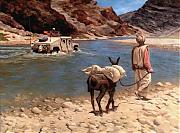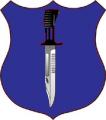In illo tempore...
Marc Tyrrell
There is a curious quality that overcomes the mind during a visit to sacred space. Today, I rode along on the staff ride at Gettysburg and saw that quality of mind slowly come into being as we moved from site to site on the battlefield. The manifestation that arose was not one of what lessons can we learn from the battle and campaign but, rather, one of what questions should we ask.
As you might have gathered, Robert and I rode in different buses even while we both took part in the same staff ride. Or did we? After the ride was over, we got the chance to talk to each other about how each of our rides operated and, as it turns out, there were some differences.
The biggest difference between our two rides lay in the tactics of how people were encouraged to interact, both with each other and with the past. In place of people having been tasked with short presentations, we were encouraged to ask questions, make comments and, in general, bring out free associations between the past, the present and the future.
I cannot say whether this difference came about as a result of differing pedagogical styles or just emerged from the group interaction. What I can say, however, is that I had an opportunity to both witness and take part in an event that I can only describe as a “ritual”. Over the course of the day, I could see people bringing the past into the present until, by the end of the ride, past and present seemed to co-mingle. It was fitting that the end of the ride was signalled by thunder, lightning and a line squall.
I describe the event as a “ritual” in a very technical sense. Fifty years ago, Mircea Eliade talked about the power of origin myths – how by re-enacting the origin myth, the participants in these rituals would touch both a “sacred time” and a source of power that could re-invigorate them. I saw some of that process operating today.
At the start of his post, Robert asked
Why would the Army waste the time of the senior leaders of its training and doctrine command with a guided tour of a 19th century battlefield? What does Gettysburg have to do with Afghanistan, Iraq, or any other conflicts the Army is likely to face?
Certainly for the ride I was on, the answer is still “Quite a lot”, but it went beyond historical analogies and lessons into something much more subtle and intangible. It set the stage for these senior leaders to reconnect with one of the key events that defines the modern United States. It was truly a case of “In that time...”.
And before someone comments that I am being overly poetic, let me note that we were primed for this by a quote that served to introduce the ride and, for our bus at least, served to close it.
In great deeds something abides. On great fields something stays. Forms change and pass; bodies disappear; but spirits linger, to consecrate ground for the vision-place of souls. And reverent men and women from afar, and generations that know us not and that we know not of, heart-drawn to see where and by whom great things were suffered and done for them, shall come to this deathless field, to ponder and dream; and lo! the shadow of a mighty presence shall wrap them in its bosom, and the power of the vision pass into their souls.
Colonel Joshua Lawrence Chamberlain, October 3rd, 1889







 Still, the point of the staff ride in this context was not so much to debate the historical example but to get folk to think about the kinds of problems that might be useful in present circumstances. You raise those questions. Is there an analogy between Lee's Gettysburg campaign and the Marine incursion into Helmand today? If so, is Lee's solution more apropos than Longstreet's or vice versa? (All with the caveat that - as Neustadt & May argue - analogies of all kinds are suspect and must be used with great care).
Still, the point of the staff ride in this context was not so much to debate the historical example but to get folk to think about the kinds of problems that might be useful in present circumstances. You raise those questions. Is there an analogy between Lee's Gettysburg campaign and the Marine incursion into Helmand today? If so, is Lee's solution more apropos than Longstreet's or vice versa? (All with the caveat that - as Neustadt & May argue - analogies of all kinds are suspect and must be used with great care).

 ).
).



Bookmarks